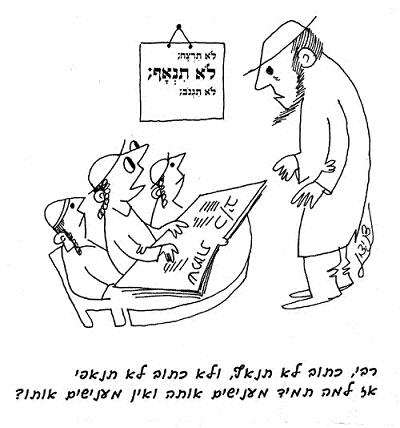
One should not wed a woman who habitually commits adultery, but the sages were divided on what a person who must chose between marrying a woman who commits adultery and the daughter of a woman who commits adultery should do. The adulterous woman has advantages and disadvantages: on one hand, she commits adultery (a disadvantage), but on the other hand there is no suspicion that she is a mamzeret (an advantage). The daughter of the adulterous woman has advantages and disadvantages: on one hand there is suspicion that she is a mamzeret (a disadvantage), but on the other hand she does not commit adultery (an advantage). Therefore the sages disagreed: According to one sage, Shmuel, it is preferable to marry the adulterous woman who is held to be of proper birth, for her mother did not habitually commit adultery, rather than the daughter of an adulterous woman, who is suspected of being a mamzeret. A different sage, R’ Yochanan, suggested that the daughter of the adulterous woman is preferable, for we do not know if she will commit adultery, but the adulterous wife is forbidden to her husband. The law was decided in favor of the daughter of the adulterous woman, for we may suppose she is not a mamzeret; though her mother habitually committed adultery we may suppose she had sexual relations with her husband more often than with other men, and since in Halacha we go according to the majority of sexual acts, we attribute the daughter to the husband and she is not a mamzeret. One of the scholars, Rav Amram, asked: What is the rule about the children of a woman known to be licentious to the extent that we suspect she has not had sexual relations with her husband more frequently than with other men? Do we suspect that her children are mamzerim? Answer: This depends on when a woman ovulates. Some of the sages state that a woman ovulates a number of days before she begins to menstruate, and according to this opinion the children are mamzerim because the husband does not know when his wife will begin to menstruate and so cannot guard his straying wife. According to another sage women ovulate when they go to the ritual bath to be purified from their menstrual impurity (11-14 days after the start of menstruation). The husband knows when his wife will be going to the ritual bath, so according to this opinion it is doubtful that the children are mamzerim. What are the issues under debate? On one hand, since the husband knows when his wife is ovulating, he will watch her to make sure she does not commit adultery during this period, in order to make sure the children are not mamzerim. On the other hand, since the woman is habitually licentious, she will succeed in giving her husband the slip and will commit adultery. (This argument is not resolved in the Talmud.)
(Babylonian Talmud, Tractate Sotah 26b-27a)
